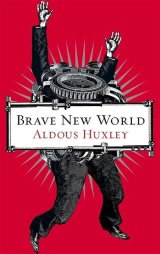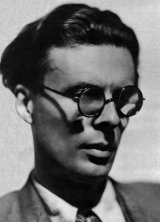Brave New World Page #3
Odd, original and irreverent, Aldous Huxley's tour de force is a darkly satiric vision of a "utopian" future --where humans are genetically bred and pharmaceutically anesthetized to passively serve a ruling order. A powerful and thought-provoking classic of speculative fiction, Brave New World is entertaining, fascinating, and terrifying all at the same time and remains remarkably relevant to this day as a warning to be heeded as we head into tomorrow.
"But in the interval," Mr. Foster concluded, "we've managed to do a lot to them. Oh, a very great deal." His laugh was knowing and triumphant. "That's the spirit I like," said the Director once more. "Let's walk around. You tell them everything, Mr. Foster." Mr. Foster duly told them. Told them of the growing embryo on its bed of peritoneum. Made them taste the rich blood surrogate on which it fed. Explained why it had to be stimulated with placentin and thyroxin. Told them of the corpus luteum extract. Showed them the jets through which at every twelfth metre from zero to 2040 it was automatically injected. Spoke of those gradually increasing doses of pituitary administered during the final ninety-six metres of their course. Described the artificial maternal circulation installed in every bottle at Metre 112; showed them the reservoir of blood-surrogate, the centrifugal pump that kept the liquid moving over the placenta and drove it through the synthetic lung and waste product filter. Referred to the embryo's troublesome tendency to anæmia, to the massive doses of hog's stomach extract and foetal foal's liver with which, in consequence, it had to be supplied. Showed them the simple mechanism by means of which, during the last two metres out of every eight, all the embryos were simultaneously shaken into familiarity with movement. Hinted at the gravity of the so-called "trauma of decanting," and enumerated the precautions taken to minimize, by a suitable training of the bottled embryo, that dangerous shock. Told them of the test for sex carried out in the neighborhood of Metre 200. Explained the system of labelling–a T for the males, a circle for the females and for those who were destined to become freemartins a question mark, black on a white ground. "For of course," said Mr. Foster, "in the vast majority of cases, fertility is merely a nuisance. One fertile ovary in twelve hundred–that would really be quite sufficient for our purposes. But we want to have a good choice. And of course one must always have an enormous margin of safety. So we allow as many as thirty per cent of the female embryos to develop normally. The others get a dose of male sex-hormone every twenty-four metres for the rest of the course. Result: they're decanted as freemartins–structurally quite normal (except," he had to admit, "that they do have the slightest tendency to grow beards), but sterile. Guaranteed sterile. Which brings us at last," continued Mr. Foster, "out of the realm of mere slavish imitation of nature into the much more interesting world of human invention." He rubbed his hands. For of course, they didn't content themselves with merely hatching out embryos: any cow could do that. "We also predestine and condition. We decant our babies as socialized human beings, as Alphas or Epsilons, as future sewage workers or future …" He was going to say "future World controllers," but correcting himself, said "future Directors of Hatcheries," instead. The D.H.C. acknowledged the compliment with a smile. They were passing Metre 320 on Rack 11. A young Beta-Minus mechanic was busy with screw-driver and spanner on the blood-surrogate pump of a passing bottle. The hum of the electric motor deepened by fractions of a tone as he turned the nuts. Down, down … A final twist, a glance at the revolution counter, and he was done. He moved two paces down the line and began the same process on the next pump. "Reducing the number of revolutions per minute," Mr. Foster explained. "The surrogate goes round slower; therefore passes through the lung at longer intervals; therefore gives the embryo less oxygen. Nothing like oxygen-shortage for keeping an embryo below par." Again he rubbed his hands. "But why do you want to keep the embryo below par?" asked an ingenuous student. "Ass!" said the Director, breaking a long silence. "Hasn't it occurred to you that an Epsilon embryo must have an Epsilon environment as well as an Epsilon heredity?" It evidently hadn't occurred to him. He was covered with confusion. "The lower the caste," said Mr. Foster, "the shorter the oxygen." The first organ affected was the brain. After that the skeleton. At seventy per cent of normal oxygen you got dwarfs. At less than seventy eyeless monsters. "Who are no use at all," concluded Mr. Foster. Whereas (his voice became confidential and eager), if they could discover a technique for shortening the period of maturation what a triumph, what a benefaction to Society! "Consider the horse." They considered it. Mature at six; the elephant at ten. While at thirteen a man is not yet sexually mature; and is only full-grown at twenty. Hence, of course, that fruit of delayed development, the human intelligence. "But in Epsilons," said Mr. Foster very justly, "we don't need human intelligence." Didn't need and didn't get it. But though the Epsilon mind was mature at ten, the Epsilon body was not fit to work till eighteen. Long years of superfluous and wasted immaturity. If the physical development could be speeded up till it was as quick, say, as a cow's, what an enormous saving to the Community! "Enormous!" murmured the students. Mr. Foster's enthusiasm was infectious. He became rather technical; spoke of the abnormal endocrine co-ordination which made men grow so slowly; postulated a germinal mutation to account for it. Could the effects of this germinal mutation be undone? Could the individual Epsilon embryo be made a revert, by a suitable technique, to the normality of dogs and cows? That was the problem. And it was all but solved. Pilkington, at Mombasa, had produced individuals who were sexually mature at four and full-grown at six and a half. A scientific triumph. But socially useless. Six-year-old men and women were too stupid to do even Epsilon work. And the process was an all-or-nothing one; either you failed to modify at all, or else you modified the whole way. They were still trying to find the ideal compromise between adults of twenty and adults of six. So far without success. Mr. Foster sighed and shook his head. Their wanderings through the crimson twilight had brought them to the neighborhood of Metre 170 on Rack 9. From this point onwards Rack 9 was enclosed and the bottle performed the remainder of their journey in a kind of tunnel, interrupted here and there by openings two or three metres wide. "Heat conditioning," said Mr. Foster. Hot tunnels alternated with cool tunnels. Coolness was wedded to discomfort in the form of hard X-rays. By the time they were decanted the embryos had a horror of cold. They were predestined to emigrate to the tropics, to be miner and acetate silk spinners and steel workers. Later on their minds would be made to endorse the judgment of their bodies. "We condition them to thrive on heat," concluded Mr. Foster. "Our colleagues upstairs will teach them to love it."
Translation
Translate and read this book in other languages:
Select another language:
- - Select -
- 简体中文 (Chinese - Simplified)
- 繁體中文 (Chinese - Traditional)
- Español (Spanish)
- Esperanto (Esperanto)
- 日本語 (Japanese)
- Português (Portuguese)
- Deutsch (German)
- العربية (Arabic)
- Français (French)
- Русский (Russian)
- ಕನ್ನಡ (Kannada)
- 한국어 (Korean)
- עברית (Hebrew)
- Gaeilge (Irish)
- Українська (Ukrainian)
- اردو (Urdu)
- Magyar (Hungarian)
- मानक हिन्दी (Hindi)
- Indonesia (Indonesian)
- Italiano (Italian)
- தமிழ் (Tamil)
- Türkçe (Turkish)
- తెలుగు (Telugu)
- ภาษาไทย (Thai)
- Tiếng Việt (Vietnamese)
- Čeština (Czech)
- Polski (Polish)
- Bahasa Indonesia (Indonesian)
- Românește (Romanian)
- Nederlands (Dutch)
- Ελληνικά (Greek)
- Latinum (Latin)
- Svenska (Swedish)
- Dansk (Danish)
- Suomi (Finnish)
- فارسی (Persian)
- ייִדיש (Yiddish)
- հայերեն (Armenian)
- Norsk (Norwegian)
- English (English)
Citation
Use the citation below to add this book to your bibliography:
Style:MLAChicagoAPA
"Brave New World Books." Literature.com. STANDS4 LLC, 2025. Web. 22 Feb. 2025. <https://www.literature.com/book/brave_new_world_2066>.








Discuss this Brave New World book with the community:
Report Comment
We're doing our best to make sure our content is useful, accurate and safe.
If by any chance you spot an inappropriate comment while navigating through our website please use this form to let us know, and we'll take care of it shortly.
Attachment
You need to be logged in to favorite.
Log In